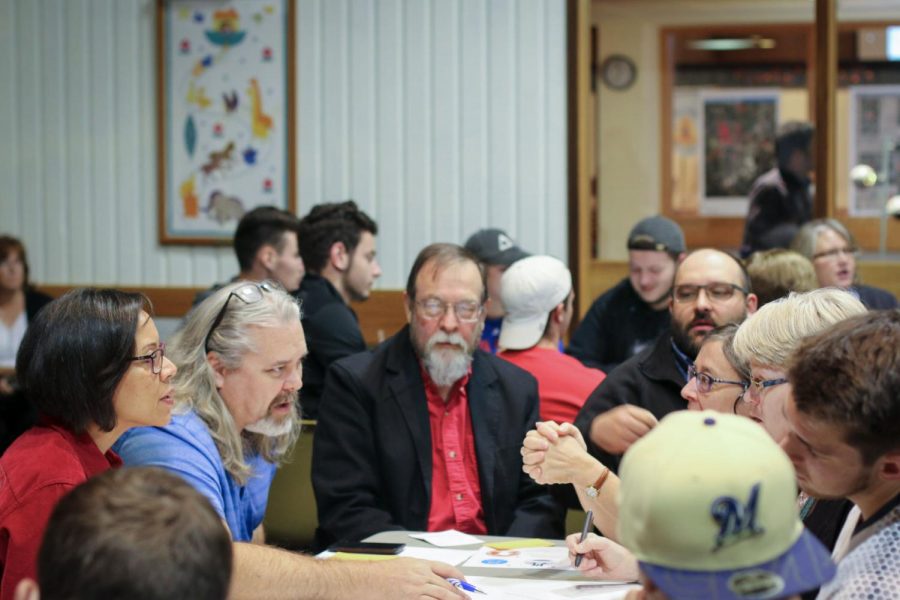Phase 1 of revitalization: Community discusses issues and ideas
September 28, 2017
DeKalb residents and students attended the first community meeting for the Annie Glidden North Revitalization Plan Wednesday to share their perspective on the needs of the community.
The initiative is intended to develop a safer neighborhood for community members and student residents.
This plan, passed by city council Aug. 14, will be funded by DeKalb and implemented over the course of two fiscal years. Alderpersons also authorized an agreement with planning firm Camiros to help lead the effort. Funding provided will not exceed $83,550 and will be divided between the first three phases of the plan and the final phase.
Phase one will address issues and opportunities, phase two will establish a vision for the revitalization plan and phase three will look into goals, objectives and strategies. The fourth phase will finalize the overall plan.
Issues and opportunities discussed at Wednesday’s meeting were generated by those in attendance. Camiros representative Adam Rosa helped direct the discussion.
Community members brought up similar issues during the discussion such as limited lighting, lack of sidewalks and transportation, high crime, safety, a lack of entertainment and the need for a grocery store.
“It was an area that was really setup for student apartments, with the assumption that the students who lived there weren’t going to be doing a ton of cooking and shopping for groceries, and that’s really no longer the case,” acting President Lisa Freeman said in an interview with the Northern Star. “We have more families living there; we have more international students living there who actually need access to groceries and cooking, and so just the makeup of the area has changed overtime.”
Attendees at the meeting were able to vote on a plan logo, and some suggested trying to give the neighborhood a name that highlights the neighborhood’s diversity.
“We have a lot of diversity in our community,” said Shirley Williams, Eden’s Garden apartments owner. “So we should look at that, too, [and] really celebrate that diversity and get things going that way.”
To jumpstart the discussion after his presentation, Rosa asked everyone to find a table and brainstorm early action projects. Each table included a map of the neighborhood and large sheets of paper to get ideas down.
“So these should be short term, these should be low cost but have a larger impact, focused and strategically located within key parts of the neighborhood, and they should be led by the community,” Rosa said.
After the brainstorming process, Rosa led the conversation by having a person from each table share what they had come up with for early action projects.
“We came up with some issues and assets like everyone else did, [and] I think a lot of people had crime and safety as their number one issue,” said Ben McCarty, junior political science major.
The area the project will encompass is to include Greek row as well as student apartments.
The area’s housing was designed with students in mind, but because of low enrollment and the low cost of the housing options, the demographics have since shifted and now include families, said Jason Michnick, DeKalb Economic Development Coordinator, during a Sept. 17 Student Association Senate meeting.
“A lot of the families that are coming out to DeKalb are coming from Cook County and Rockford and are generally lower income because the housing that was built for students is exceptionally affordable at a market level,” Michnick said. “So there’s issues that come along with that, and we want to make sure that we’re hearing the voices of students because there still are quite a few students living in that neighborhood”
Many international and general off-campus students live in the neighborhood, Freeman said. Because of the shift in demographics, this plan is seeking to adjust to the neighborhood’s needs accordingly.
“Now it’s no secret that the enrollment at NIU has been down for the last few years; it hurts everyone in DeKalb,” McCarty said. “The more students you bring in, the more money they’re putting into the local economy. We need to invest in bringing more students here.”
The task force
Alderpersons approved Mayor Jerry Smith’s appointments for a 30-person task force to partake in the revitalization plan during a Monday city council meeting.
The task force includes individuals from the city and NIU campus community, such as Student Association President Rachel Jacob, attorney Christi Krupp and Tiara Huggins, president of the University Village Tenants’ Association.
“Believe me, I could have named 60 people instead of 30 people very easily,” Smith said at the meeting. “That’s how many people that were interested in this process, and that is so heartening to me.”
Second ward alderperson Bill Finucane and first ward alderperson David Jacobson were approved to act as liaisons between the city and the task force.
It is the responsibility of the task force to promote meetings, encourage a broader range of attendees, provide information about entities that could assist the revitalization effort, reflect concerns of residents and stakeholders, provide feedback and commentary and help identify partners as well as guide implementation after planning, according to the Annie Glidden North Task Force Member Role Description.
The task force had a separate meeting Wednesday and covered much of the same ground as in the community meeting. Several task force members were present at the community meeting to get a better understanding of the different needs community members were voicing.
“Well I’d just like to say that I’m kind of blown away by the energy and the enthusiasm and the positivity here tonight. Coming into the first meeting, you never know what to expect, but I really appreciate you all coming to the table [and] getting out your ideas and opinions.”







